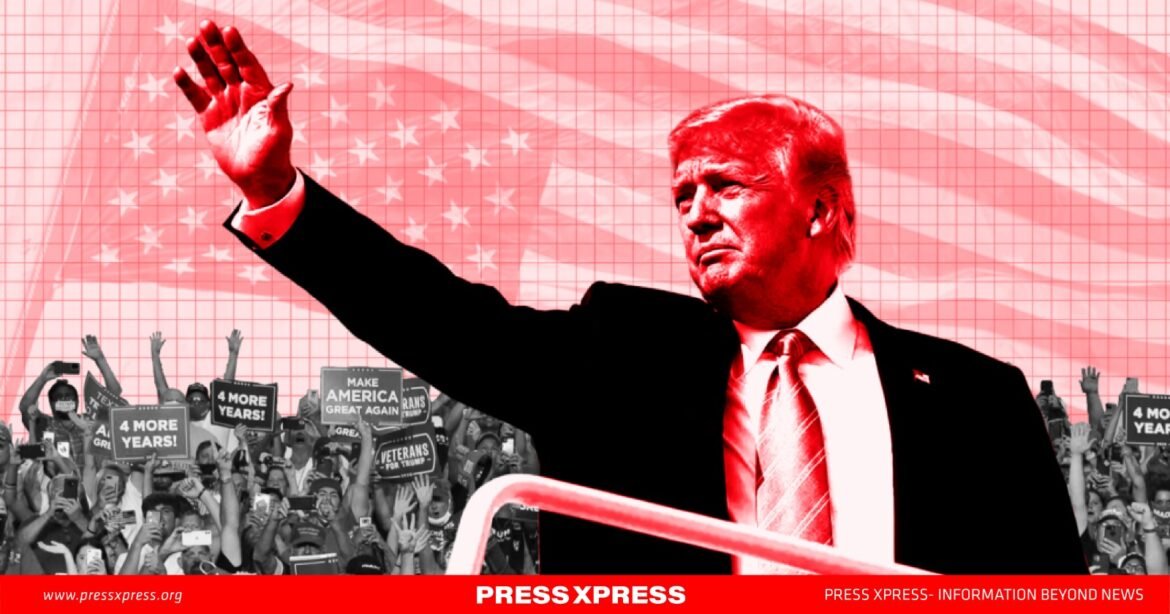Recent statements from U.S. Vice President Kamala Harris and former Chief of Staff John Kelly, referring to former President Donald Trump as a fascist, have rekindled debates over whether Trump’s governance aligns with fascist principles.
This label is not only controversial but loaded with historical implications, typically linked to authoritarian regimes that restrict freedoms, concentrate power, and eliminate opposition. Trump’s critics often cite his hardline stance on immigration, “America First” policies, and confrontational style as evidence of fascist tendencies, while his supporters argue that these actions were within democratic norms. A close examination of his policies, speeches, and statements can shed light on the reality behind these accusations.
Interestingly, Trump once said he wanted to “be a fascist for one day.” This statement, while provocative, raises questions about the intentions behind his rhetoric and whether his style is fascist or simply politically unorthodox.
Trump’s Speech and Rhetoric
Trump’s speeches often come across as provocative, intended to energize his base and challenge political opponents. His remark about wanting to “be a fascist for one day” is a striking example. Contextually, Trump made this comment in a light-hearted, sarcastic tone during a rally where he criticized bureaucratic inefficiencies, often blaming the entrenched Washington establishment. His statement aimed to emphasize the difficulty he faced in implementing policy changes swiftly within the constraints of American governance.
This comment was more of a rhetorical exaggeration than an actual desire to embrace fascist principles. His intent was likely to appeal to supporters frustrated by slow bureaucratic processes rather than signal a genuine intention to assume authoritarian control. Trump’s speeches frequently use hyperbole, often blurring the line between serious policy goals and rally-stage rhetoric. His speech style, while unorthodox and often combative, tends to emphasize American values such as independence and strength, rather than calling for authoritarian rule or the suppression of dissenting views.
“It is deeply troubling and incredibly dangerous that Donald Trump would invoke Adolf Hitler, the man who is responsible for the deaths of 6 million Jews and hundreds of thousands of Americans. This is a window into who Donald Trump really is, from the people who know him best. It is clear from John Kelly’s words that Donald Trump is someone who, I quote, ‘certainly falls into the general definition of fascists’, who, in fact, vowed to be a dictator on day one and vowed to use the military as his personal militia to carry out his personal and political vendettas.”
Vice President Kamala Harris
Revised Analysis: Nationalism and ‘America First’ in Trump’s Speeches
Trump’s speeches consistently echo themes of nationalism and patriotism, with “America First” as a prominent refrain. He has made clear his intent to prioritize American interests across trade, foreign policy, and military spending. Critics argue this nationalistic tone mirrors rhetoric seen in authoritarian regimes. However, nationalism, when devoid of authoritarian actions or suppression of opposition, does not inherently equate to fascism. Trump’s version of nationalism has focused heavily on economic self-interest rather than exclusionary or ideologically rigid purity—a distinct departure from fascist ideologies.
In his speeches on trade and immigration, Trump frequently emphasizes job restoration in America, reinforced borders, and reduced reliance on foreign entities. This rhetoric, though populist, roots itself in economic and security concerns rather than calls for absolute state control. Furthermore, Trump’s emphasis on sovereignty aligns with practices common among democratic leaders and remains compatible with democratic values.
Media Relations: A Contentious but Permitted Critique
Throughout his tenure, Trump frequently criticized the mainstream media, often branding certain outlets as “fake news.” This confrontational stance drew accusations of an attempt to undermine press freedom. However, Trump’s vocal criticisms did not translate into formalized actions to suppress media operations; mainstream outlets continued to operate and critique his administration openly.
While Trump’s remarks about certain journalists appeared confrontational, they reflect his perspective rather than an attempt to restrict the free press through force or legislation. His contentious media relationship manifested in public debate, not repression.
Emphasis on ‘Law and Order’
Trump’s repeated emphasis on “law and order” during periods of civil unrest raised concerns about his commitment to democratic freedoms. His rhetoric in support of a “strong hand” approach was seen as provocative, yet similar calls for order have surfaced across multiple U.S. administrations in response to disorder. Trump’s deployment of the National Guard in cities like Portland and Seattle reflected a stance on public safety, but he stopped short of implementing sweeping policies that suppress political opposition.
Although his statements about “dominating the streets” sounded aggressive, his actions ultimately adhered to democratic checks, with local governments and courts intervening as needed to limit overreach. Trump’s approach to law and order, while hardline, respected legal processes, distinguishing it from the suppression seen in authoritarian states.
Understanding Trump’s Rhetoric and Reality
Trump’s off-the-cuff remarks, especially during rallies, often carry provocative tones but rarely transition into authoritarian policy. His quip about wanting to “be a fascist for one day” stemmed from frustration with bureaucracy rather than a genuine push for centralized power. His outspoken style, appealing to a dissatisfied electorate, sometimes blurred the line between strength and authoritarianism.
Trump’s governance reflects his business background, favoring efficiency and decisive action, which occasionally clashed with the slow, procedural nature of the American government. Nevertheless, Trump largely adhered to constitutional checks and balances, a key distinction from true fascist governance. Judicial and legislative constraints within American democracy limited his actions, while his rhetoric, albeit polarizing, did not fundamentally erode democratic structures.
In sum, Trump’s presidency is characterized by bold statements and populist appeals but does not fit the historical model of authoritarian rule. Statements like wanting to “be a fascist for one day” are better understood as expressions of frustration rather than aspirations for authoritarian control.
Trump’s polarizing style and rhetoric have fueled debates, but the evidence does not support labeling him a fascist in the historical sense. Instead, his actions reveal a complex leadership style that prioritizes American interests through democratic—albeit unconventional—channels.


